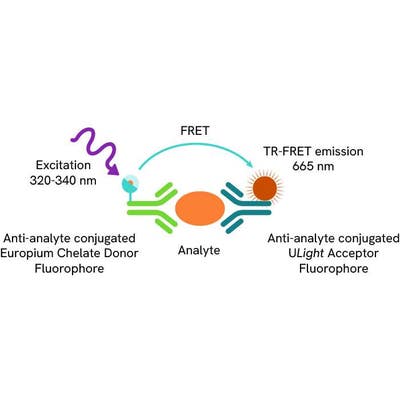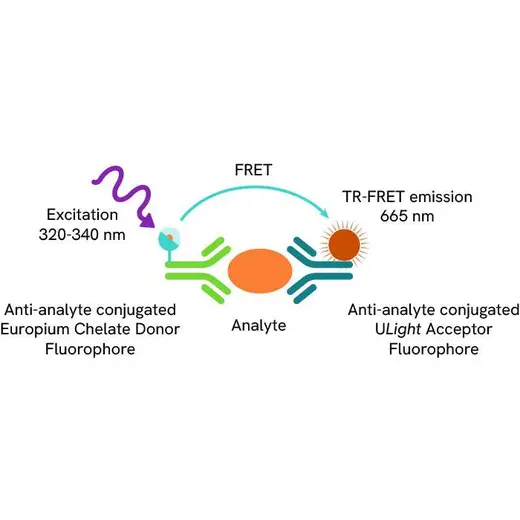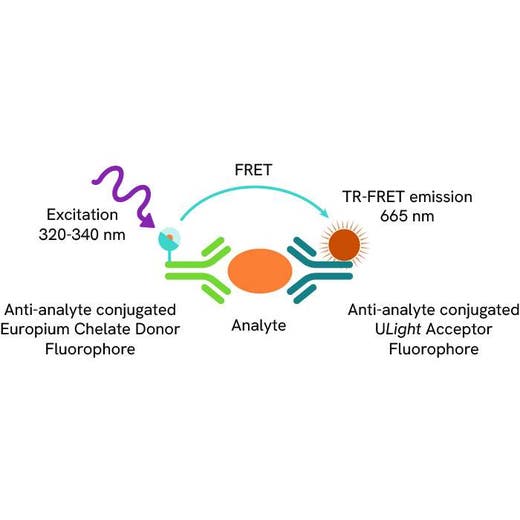
LANCE Ultra Mouse TNF-α Detection Kit, 500 Assay Points

LANCE Ultra Mouse TNF-α Detection Kit, 500 Assay Points




The LANCE® Ultra Mouse TNFα Detection Kit is designed for detection and quantitation of mouse tumor necrosis factor α in cell culture media using a homogeneous TR-FRET (no-wash steps, no separation steps) assay.
For research use only. Not for use in diagnostic procedures. All products to be used in accordance with applicable laws and regulations including without limitation, consumption and disposal requirements under European REACH regulations (EC 1907/2006).
| Feature | Specification |
|---|---|
| Application | Protein Quantification |
| Dynamic Range | 19.2- 30,000 pg/mL |
| Limit of Detection | 19.2 pg/mL |
| Limit of Quantification | 94.6 pg/mL |
| Sample Volume | 15 µL |
The LANCE® Ultra Mouse TNFα Detection Kit is designed for detection and quantitation of mouse tumor necrosis factor α in cell culture media using a homogeneous TR-FRET (no-wash steps, no separation steps) assay.
For research use only. Not for use in diagnostic procedures. All products to be used in accordance with applicable laws and regulations including without limitation, consumption and disposal requirements under European REACH regulations (EC 1907/2006).


LANCE Ultra Mouse TNF-α Detection Kit, 500 Assay Points


LANCE Ultra Mouse TNF-α Detection Kit, 500 Assay Points


Product information
Overview
The LANCE Ultra Mouse TNFα Detection Kit is designed for detection and quantitation of mouse tumor necrosis factor α in cell culture media using a homogeneous TR-FRET (no-wash steps, no separation steps) assay.
The 500 point kit contains enough reagents to run 500 wells in 384-well format, using a 20 µL reaction volume (15 µL of sample). The 10,000 point kit contains enough reagents to run 10,000 wells in 384-well format, using a 20 µL reaction volume (15 µL of sample).
- No-wash steps, no separation steps
- TR-FRET technology
- Sensitive detection
- High reproducibility
- Faster time-to-results
- Easy automation
- 96-well, 384-well, and 1536-well formats
LANCE and LANCE (Lanthanide chelate excite) Ultra are our TR-FRET (time-resolved fluorescence resonance energy transfer), homogeneous (no wash) technologies. One antibody of interest is labeled with a donor fluorophore (a LANCE Europium chelate) and the second molecule is labeled with an acceptor fluorophore (ULight™ dye). Upon excitation at 320 or 340 nm, energy can be transferred from the donor Europium chelate to the acceptor fluorophore if sufficiently close for FRET (~10 nm). This results in the emission of light at 665 nm.
In the mouse, Tumor Necrosis Factor alpha (TNFα) is primarily produced as a homotrimeric 235 amino acid membranebound protein. The soluble mature homotrimeric form of 156 amino acids is then released by the metalloprotease TNFα converting enzyme. In humans, TNFα is produced by many cell types like macrophages, monocytes, neutrophils, T cells, and NK cells. It causes cytolysis and cytostasis of many tumor cell lines in vitro. Within hours of injection, TNFα leads to the destruction of small blood vessels within malignant tumors. Although TNFα inhibits the growth of endothelial cells in vitro, it is a potent promoter of angiogenesis in vivo. In contrast to chemotherapeutic drugs, TNFα specifically attacks malignant cells. Furthermore, TNFα is associated with autoimmune disorders, and antibodies directed against TNFα have proven useful.
Specifications
| Application |
Protein Quantification
|
|---|---|
| Automation Compatible |
Yes
|
| Brand |
LANCE Ultra
|
| Detection Modality |
LANCE
|
| Dynamic Range |
19.2- 30,000 pg/mL
|
| Limit of Detection |
19.2 pg/mL
|
| Limit of Quantification |
94.6 pg/mL
|
| Product Group |
Kit
|
| Sample Volume |
15 µL
|
| Shipping Conditions |
Shipped in Blue Ice
|
| Target |
TNFα
|
| Target Class |
Cytokines
|
| Target Species |
Mouse
|
| Technology |
TR-FRET
|
| Therapeutic Area |
Inflammation
Oncology
|
| Unit Size |
500 Assay Points
|
Resources
Are you looking for resources, click on the resource type to explore further.
Emerging pathways to neuroinflammation and neurodegeneration
Neurodegenerative diseases, such as amyotrophic lateral sclerosis...


How can we help you?
We are here to answer your questions.






























